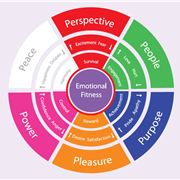As enthusiasm for New Year diets begins to wear off, and the pounds start to pile back on, Paul Bird, author of new self-help book Emotional Fitness, believes destructive eating habits are not a food problem - but an emotional one. Here, he shares advice on how to lose weight by getting emotionally fit..
Why do we overeat? Is there a fundamental reason why our eating habits are out of control?
 Hungry or just bored?The problem with obesity is that we eat when we don’t need to. It sounds obvious, but emotions such as boredom, apathy, anxiety, worry, depression, sadness and so on make us feel uncomfortable and, rather than rationally tackling the underlying causes of these emotions, our emotional brain overwhelms us demanding short term relief.
Hungry or just bored?The problem with obesity is that we eat when we don’t need to. It sounds obvious, but emotions such as boredom, apathy, anxiety, worry, depression, sadness and so on make us feel uncomfortable and, rather than rationally tackling the underlying causes of these emotions, our emotional brain overwhelms us demanding short term relief.
And it stems from birth.
As babies, we cry out when we’re in emotional distress and we get breast milk that contains chemicals to calm us down. One of the downsides is that we subconsciously remember this reward pattern and so turn to food and drink as adults to comfort ourselves when emotionally challenged.
Eating is a habit we condition our brain to accept. The secret lies in satisfying our emotional needs positively, rather than allowing our impatient emotional brain to drive us to food and drink before we have made a choice.
Top tips for banishing destructive eating habits
Every day write down :
- What you ate that day (even snacks)
- The location of where you ate it
- The reason you ate (eg. I was starving / I had to have breakfast / I was bored)
- The time you ate
- How hungry you were when you ate on a scale of 1 - 10 (1 = not hungry / 10 = starving)
- How much you enjoyed what you ate on a scale of 1 - 10 (1 = didn’t enjoy it / 10 = loved it)
2. At the end of the week review your diary and write out a seven day eating plan which you believe you can stick to for the next week based on the following criteria:
- Design your eating around how you normally behave
- Identify the times you ate last week when you didn’t need or want to eat. Try to eliminate those completely this week.
- Identify the times when you ate out of habit or because you were bored. Try to eliminate those completely this week or plan to eat something more healthy on those occasions eg. fruit instead of bread or plan to do something else at those times which does not give you the opportunity to eat eg. go for a walk instead of watching the TV.
- Identify your main meal times last week. This week, arrange to either replace those meals with something more healthy (but something you like eating) or eat the same thing but reduce the usual quantity you eat.
 Emotional Fitness- Identify your snacking habits from last week eg. eating chocolate at work / eating crisps when watching TV. Either cut out those snacks or choose something you can snack on which is healthier than foods which are high in carbohydrate or sugar.
Emotional Fitness- Identify your snacking habits from last week eg. eating chocolate at work / eating crisps when watching TV. Either cut out those snacks or choose something you can snack on which is healthier than foods which are high in carbohydrate or sugar.
- Look at the places you ate last week and see if avoiding those places this week reduces your habit of eating.
3. If alcohol is your problem, then use your diary to record your alcohol consumption separately. Apply the same principles above to your drinking and try to impose rules you can stick to on the amount of alcohol you can have each day. See if you can restrict your alcohol consumption to no more than three days a week if you are a daily drinker and decide a maximum consumption you can have for those three days.
4. Hunger pangs strike in waves, so the next time you feel hungry don’t deny yourself food, just practice deep breathing for five minutes and promise yourself that you will decide what to eat in 20 minutes. Unless it is your actual mealtime, most hunger pangs will disappear after 15 to 20 minutes. If they don’t then your body is telling you you need to eat. Distraction is better than diet.
5. Eating a little and often is by far the best advice. Because it takes 20 minutes for the stomach to tell the brain that we have received food, we tend to eat too much in that 20 minutes because we still feel hungry. Afterwards we feel ‘stuffed’ and wish we had eaten less. Eating fruit or other healthy options every hour can keep the emotional ‘starvation’ feeling at bay.
Paul’s book Emotional Fitness…Changing The Way You Think And Feel explains Emotional Fitness in more detail and provides more than 40 mental workouts people can use to positively satisfy their needs and strengthen their mental agility. It’s available from Amazon priced at £9.99 and £7.99 for the Kindle version.
You can also join his free online Emotional Fitness gym here: www.emotionalfitnessgym.co.uk



